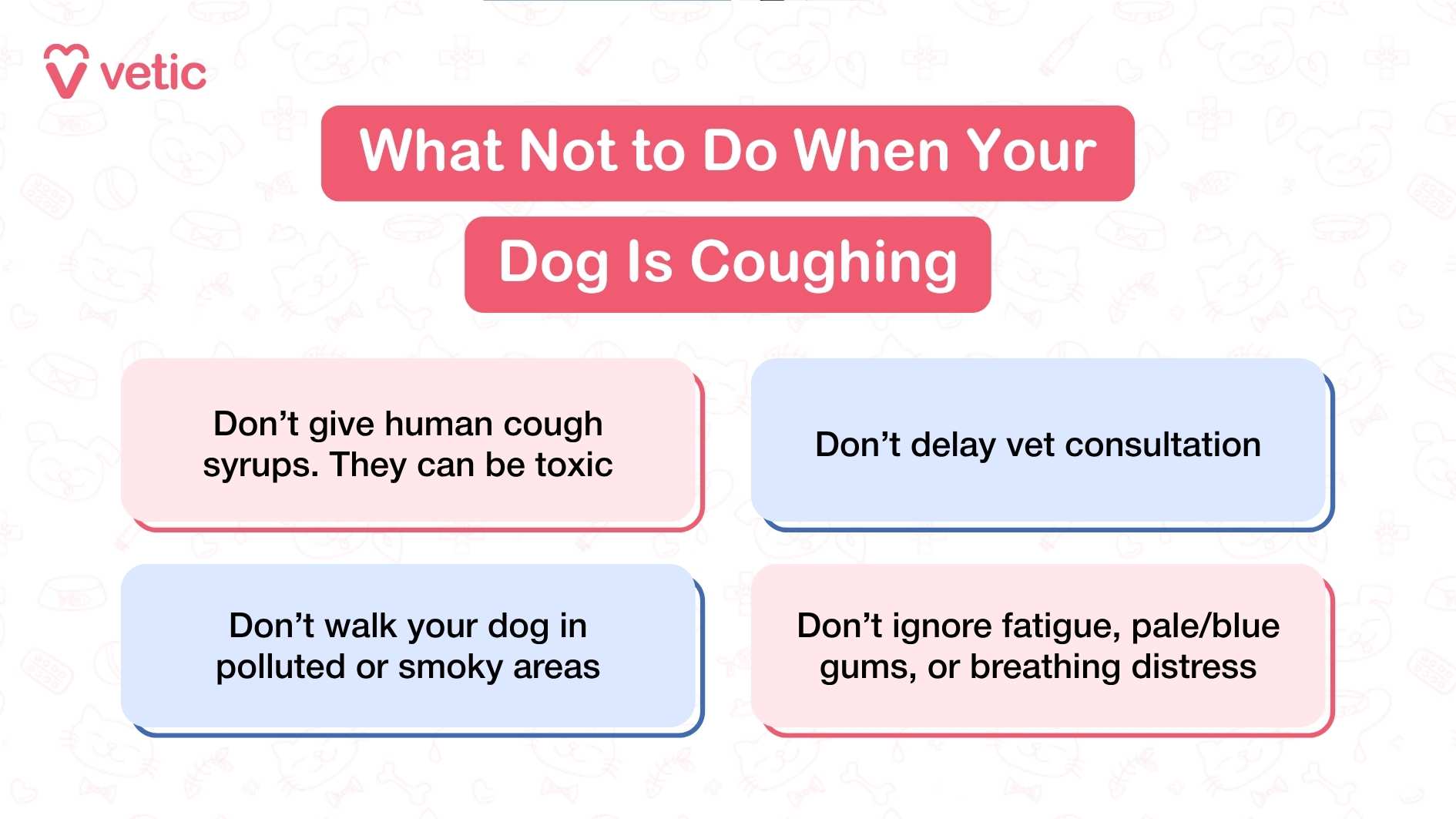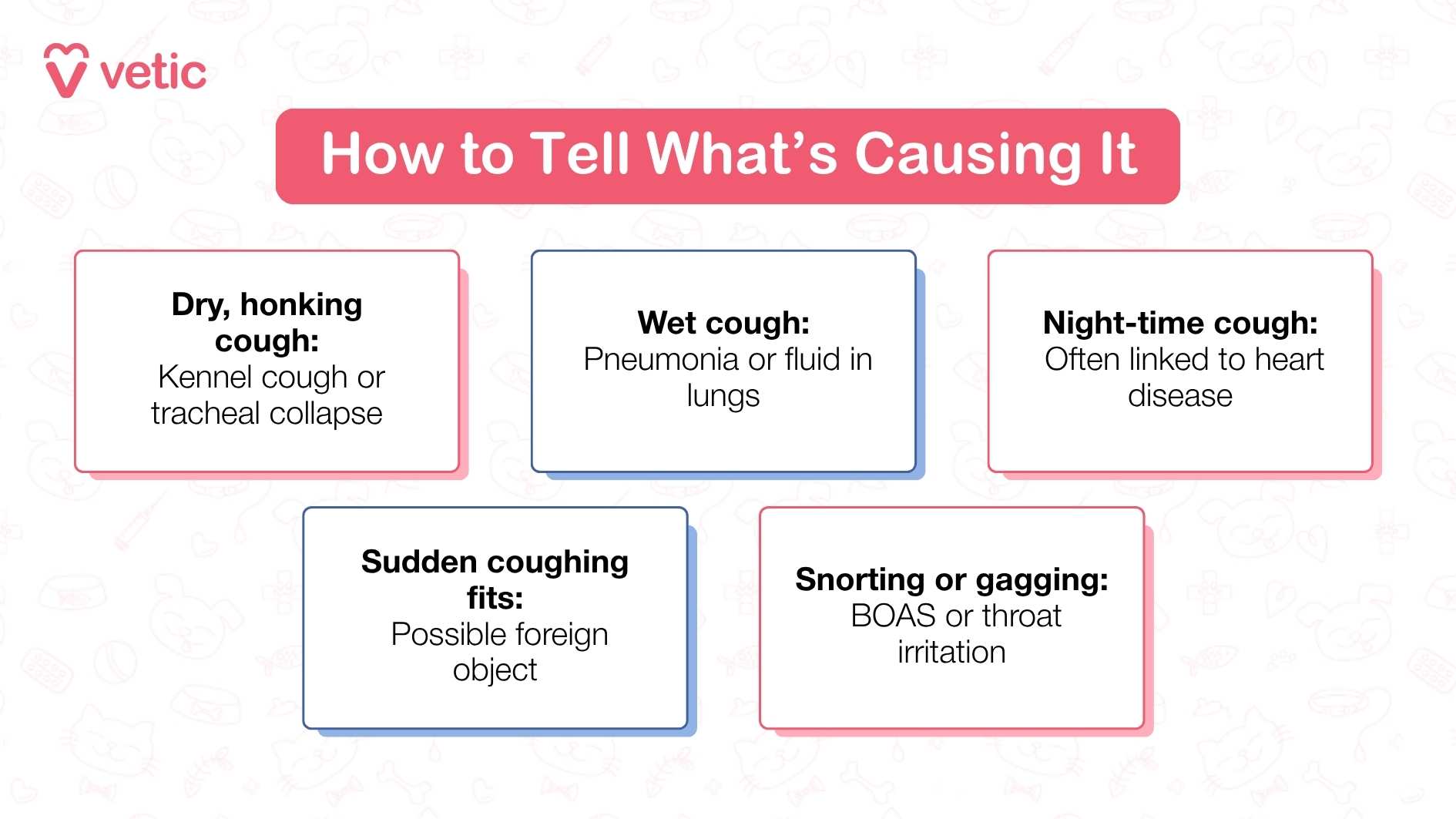Hearing your dog cough can be worrying and with good reason. A dog’s cough can mean anything from a mild throat irritation to a serious health condition. The key is understanding why your dog is coughing and when to seek veterinary help.
This article explains the 12 most possible reasons your dog is coughing, how to identify them, and what you should do next.
What Are the Most Common Reasons Dogs Cough?
Dogs cough for the same reason humans do, to clear irritants or mucus from the throat. But sometimes, it points to something deeper, such as infection or heart problems.
Common Causes of Dog Coughing:
- Collar pressure or leash strain
- Kennel cough
- Canine influenza (dog flu)
- Canine parainfluenza
- Heart disease
- Pneumonia or lung congestion
- Allergies and irritants
- Foreign object stuck in throat
- Heartworm infection
- Tracheal collapse
- Laryngeal paralysis
- BOAS (Brachycephalic Obstructive Airway Syndrome)

Could My Dog’s Collar or Leash Be Making Them Cough?
If your dog starts coughing while pulling on the leash, the collar could be the cause. A tight collar or constant pressure on the trachea can irritate the throat.
Switch to a harness or martingale collar to prevent long-term damage. Persistent coughing even after switching may indicate throat injury and requires a veterinary check.
What Is Kennel Cough and How Serious Is It for Dogs?

Kennel cough (Bordetella bronchiseptica) is a highly contagious respiratory infection common among dogs that visit kennels, daycares, or grooming centres.
It produces a dry, hacking “honking” cough and may cause mild fever or nasal discharge. While most cases are mild, unvaccinated dogs can develop pneumonia.
Annual kennel cough vaccination is the best preventive measure.
Can Dogs Get the Flu? Understanding Canine Influenza
Canine influenza (dog flu) is caused by H3N8 or H3N2 viruses and spreads through coughing or sneezing.
Dogs may have a moist cough, fever, nasal discharge, or loss of appetite.
Although vaccines for dog flu are not widely available in India, symptomatic treatment and isolation are key to recovery.
What Is Canine Parainfluenza and Can It Cause Coughing?
Canine parainfluenza is another viral respiratory infection that causes coughing similar to the flu.
Unvaccinated dogs are at higher risk, and it can lead to secondary infections such as kennel cough.
Ensure your dog’s core vaccinations include protection against parainfluenza.
Can Heart Disease Make My Dog Cough a Lot?
Yes. Persistent, dry coughing in resting or sleeping dogs can be an early sign of congestive heart failure.
Heart disease causes fluid buildup around the lungs, leading to difficulty breathing. A veterinary exam, chest X-ray, or ECG can confirm it.
With timely medication and monitoring, most dogs can live comfortably.
Is My Dog’s Cough Caused by Pneumonia or Chest Congestion?
Pneumonia in dogs occurs when bacteria or viruses infect the lungs.
Symptoms include wet coughing, fever, lethargy, and difficulty breathing.
Prompt antibiotic treatment usually leads to full recovery, but ignoring it can be life-threatening.
Can Allergies or Room Fresheners Make Dogs Cough?
Yes. Just like humans, dogs can cough due to allergies from dust, pollen, perfumes, or air fresheners.
You might also notice sneezing, watery eyes, or a runny nose. Switch to unscented cleaning products and keep air filters clean. If symptoms persist, your vet can prescribe antihistamines or perform allergy tests.
Could Something Be Stuck in My Dog’s Throat?
A foreign object such as grass, seeds, or small toys may get lodged in your dog’s throat, causing sudden coughing fits or gagging.
If coughing lasts more than 24 hours or your dog struggles to breathe, visit a vet immediately. Attempting to remove it yourself can cause further injury.
What Is Heartworm and Why Does It Make Dogs Cough?
Heartworm disease is spread by mosquito bites and is more common in tropical regions like India.
The worms invade the heart and lungs, leading to a dry, persistent cough and exercise intolerance.
Heartworm prevention medication is safe, affordable, and should be given year-round.
What Is Tracheal Collapse in Dogs and Why Is It Dangerous?
Tracheal collapse is a life-threatening condition where the windpipe weakens and narrows, making breathing difficult. You will hear a loud, harsh, honking cough, especially when your dog is excited.
Emergency veterinary care is crucial, oxygen therapy and medications can help stabilize the condition.
Why Do Senior Dogs Get Laryngeal Paralysis?
Laryngeal paralysis mostly affects large-breed senior dogs like Labradors. You will notice voice changes, heavy panting, or coughing after exercise.
Early diagnosis and weight management can prevent severe breathing distress later in life.
What Is BOAS and Why Do Flat-Faced Dogs Cough So Often?
BOAS (Brachycephalic Obstructive Airway Syndrome) affects breeds like Pugs, Bulldogs, and Shih Tzus.
Their narrow airways cause snoring, coughing, gagging, and exercise intolerance. Keep your dog’s weight in check and avoid heat exposure. Surgical correction may help in severe cases.
My Dog Won’t Stop Coughing — What Should I Do Right Now?
Take note of how long the cough lasts, what triggers it, and whether it sounds wet or dry.
If coughing persists or worsens, see a veterinarian immediately.
Emergency signs include:
- Blue or pale gums
- Collapse or open-mouth breathing
- Blood or foam in cough
- Refusal to eat or severe lethargy
How Does a Vet Diagnose the Cause of Dog Coughing?
Your veterinarian will perform a physical exam and chest auscultation, followed by tests such as:
- Chest X-rays
- Blood and biochemistry tests
- Heartworm antigen test
- Bronchoscopy (in chronic cases)
These help rule out heart disease, infection, or airway blockages.
How Do You Treat a Cough in Dogs?

Treatment depends on the cause, but it is critical not to self-medicate. Human cough syrups can be toxic for pets because they can have xylitol.
What Can I Do at Home for My Dog’s Mild Cough?
- Provide plenty of rest and water
- Use a humidifier to ease breathing
- Avoid perfume, smoke, or cleaning sprays
- Keep your dog warm and indoors during monsoon
What Treatments Do Vets Use for Severe or Chronic Coughs?
- Antibiotics for bacterial infections
- Bronchodilators for airway diseases
- Heart medications for cardiac coughs
- Surgery for tracheal collapse or BOAS
- Oxygen therapy in emergencies
Do not self-diagnose. Book a Vetic vet consultation for professional evaluation.
When Should I Take My Coughing Dog to the Vet?
You should consult a veterinarian if:
- The cough lasts longer than three days
- Your dog coughs up blood or mucus
- Breathing appears difficult or noisy
- Your dog seems weak, pale, or collapses
Delays can turn a treatable infection into an emergency.
If you are in Delhi, Gurgaon, Noida, or Chennai, visit your nearest Vetic Pet Clinic for prompt care.
FAQs
1. Why does my dog cough at night?
Coughing at night can signal heart issues or kennel cough, both of which worsen when your pet lies down.
2. Can kennel cough go away on its own?
Mild cases resolve within two weeks, but severe ones need antibiotics. Vaccination is the best prevention.
3. My dog coughs after walks; should I worry?
Yes, it may be tracheal irritation from leash strain or heart disease. Switch to a harness and consult your vet.
4. How can I tell if my dog’s cough is serious?
Any cough with breathing difficulty, bluish gums, or fatigue is serious and requires veterinary attention.
5. Can dust or air pollution cause dog coughing?
Yes, especially in cities like Delhi or Mumbai. Limit outdoor walks during high pollution days.



